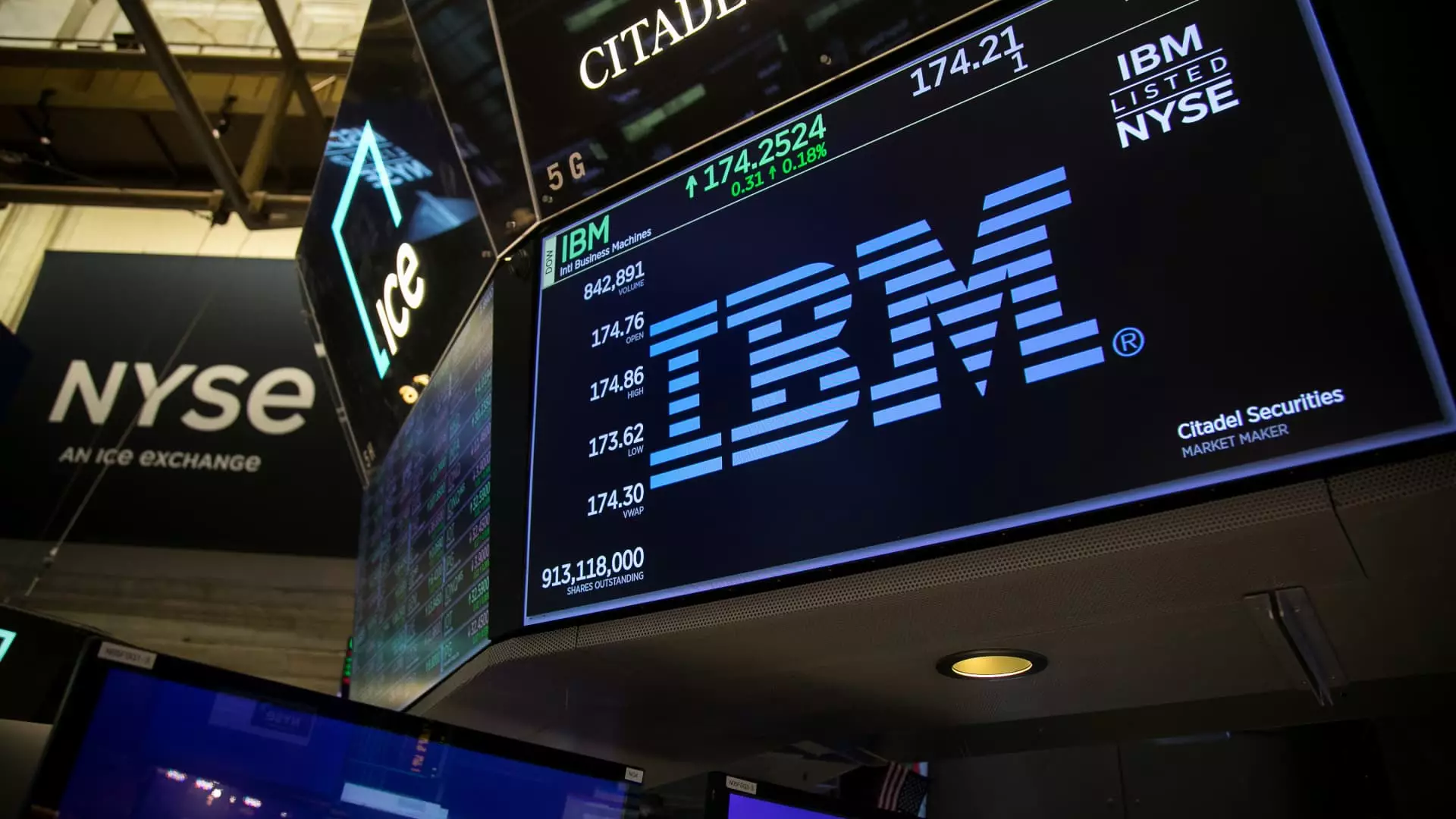In recent months, IBM has emerged as a surprising frontrunner within the prestigious Dow Jones Industrial Average. With a staggering 27% gain over the last three months, the once-storied tech giant has regained attention in the stock market. However, despite this encouraging performance, prominent market strategist Scott Nations, who serves as president and chief investment officer at Nations Indexes, cautions investors to maintain a discerning perspective. Nations recently expressed his sentiments on CNBC’s “Power Lunch,” emphasizing the need for IBM to substantiate its momentum, particularly in the realm of artificial intelligence (AI).
Nations’ prudent stance comes on the heels of IBM’s recent financial disclosures, wherein the tech behemoth reported fourth-quarter results that eclipsed Wall Street expectations. The earnings stood at an impressive figure, bolstered by a 10% increase in software revenue, which soared to $7.9 billion year-on-year. A pivotal element driving this growth is the rising demand for AI-driven solutions, particularly through its Red Hat Linux offerings. Even so, Nations still harbors reservations regarding IBM’s strategy and competitive positioning in the burgeoning AI landscape, indicating a wait-and-see approach before taking any further investment actions.
Nations highlighted IBM’s unique approach to AI development, which diverges from that of its prominent industry peers. The strategy, termed ‘DeepSeek,’ is a point of contention; the efficacy and potential of this model remain uncertain. In this vein, DeepSeek’s recent announcement, which rattled global markets by disclosing the creation of a formidable AI model at a mere $6 million cost, only amplifies the scrutiny surrounding IBM. This revelation has incited debate regarding the possible ramifications for established players in the AI sector. Nations alluded to the need for greater clarity on how IBM will capitalize on its current momentum amidst this disruptive shift.
Despite the uncertainty, CEO Arvind Krishna made optimistic assertions, noting that IBM has accrued $5 billion in potential business from generative AI initiatives. Such figures convey a level of corporate confidence, signaling that IBM positions itself as a leader in AI transformation. However, Nations’ reticence suggests that investors should carefully evaluate IBM’s next steps and responsiveness to competitive pressures.
Turning to other significant market players, Nations pointed toward Uber, a company currently undergoing its own transformation. Following a disappointing quarterly earnings report and a subsequent drop in stock price, some analysts might view Uber as a risky proposition. Nevertheless, Nations is optimistic, advocating for a strategic “buying the dip.” A particularly promising development for Uber is its aggressive stock repurchase plan, aimed at bolstering shareholder confidence amid a challenging environment.
In addition, the impending rollout of Uber’s robotaxi services in Austin, Texas—a collaborative initiative with Alphabet’s Waymo—hints at brighter prospects in the long-term horizon. CEO Dara Khosrowshahi’s acknowledgment of the multi-year journey ahead in constructing a viable autonomous vehicle market underscores that while the ambitions are extensive, immediate impact might be limited. Nonetheless, Nations’ enthusiasm aligns with a broader view of the trillion-dollar opportunity that autonomous vehicles represent in the near future.
Lastly, Nations took note of Mattel, which has recently seen an impressive stock surge of 14%, reaching a significant year-high following the announcement of its fourth-quarter earnings. The toy manufacturer reported profits well above expectations, with earnings at 35 cents per share on revenues of $1.65 billion, surpassing analyst projections. Nations indicated that the stock’s appeal is further heightened by a notable increase in stock buybacks, which signify a commitment to enhancing shareholder value.
With a cautious but optimistic outlook, Nations suggested that he would consider investing if Mattel’s stock retracted below the $20 threshold—a scenario that seems plausible given the market’s often volatile nature. The combination of robust earnings reports and proactive financial strategies such as stock repurchase programs often generates renewed excitement among investors, and Mattel has successfully fanned the flames of such investor interest.
While IBM appears to be making strides, concerns linger regarding its competitive edge in AI. Conversely, both Uber and Mattel present unique investment narratives that could attract different types of investors. Ultimately, strategic decision-making in this fluctuating market will require careful consideration of a company’s long-term prospects and current performance. Nations’ insights serve as a valuable reminder that while the stock market offers tantalizing opportunities, discernment is key.

